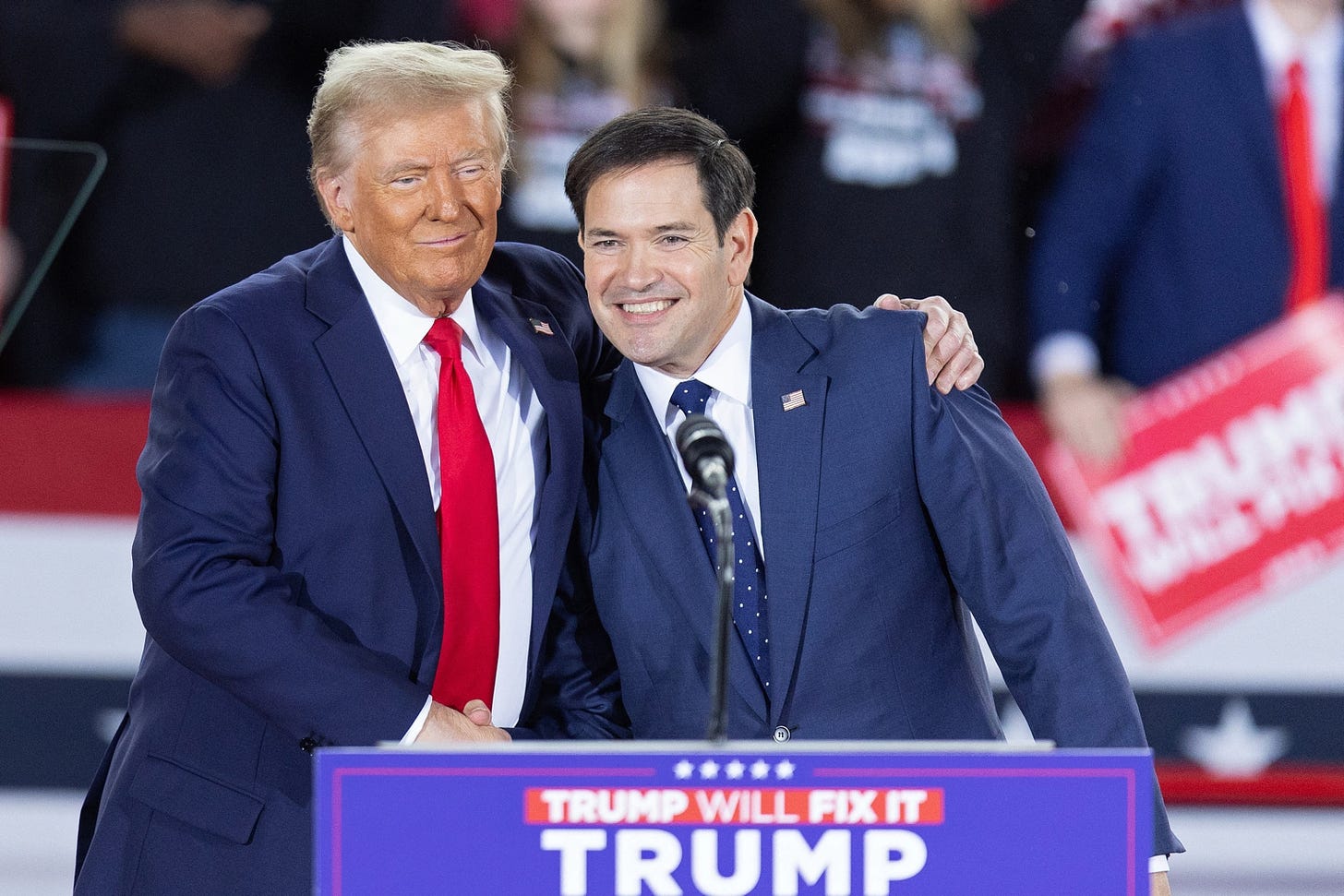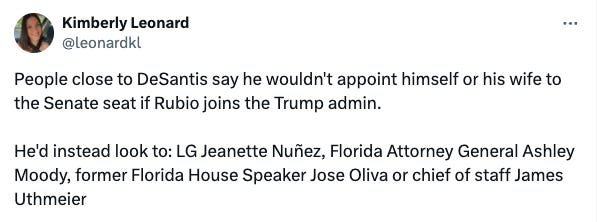In 70 days, Donald Trump will be sworn in as the 47th president of the United States. I will be here bringing you everything you need to know between now and then — and over his four years as president.
If you want to support independent and nonpartisan journalism that is both transparent and authentic, I’m your guy. Become a paid subscriber to this newsletter. It’s $6 a month and $60 a year. 👇
1. What is the GOP going to DO?
With Decision Desk HQ officially calling the House for Republicans on Monday night, the GOP is assured of unified control of the White House and Congress for the next two years.
It’s the first time that Republicans have had the presidency as well as majorities in the House and Senate since 2017 — the first two years of the first Trump presidency.
All of which raises a critical question : What are Donald Trump and the GOP congressional leaders going to do with that advantage?
To answer that, it’s worth actually going back to 2017 to see what Trump and the Republican-controlled Congress did the last time they found themselves in this situation.
The biggest success Trump and the GOP Congress had in his first two years was in passing a major tax cut. It took most of the year — the legislation eventually passed the Senate in December 2017 — but in the end, Trump got what he wanted: A $1.5 trillion tax bill that lowered both the corporate tax rate and the amount wealthy individuals paid into the U.S. government.
The legislation passed on a pure party line vote in the House and Senate, with not a single Democratic lawmaker voting for it.
“It's going to be a tremendous thing for the American people,” Trump predicted at a signing ceremony just days before Christmas of that year. “It's going to be fantastic for the economy. It's going to keep companies from leaving our shores. I consider this very much a bill for the middle class, a bill for jobs.”
Did it work? That depends on who you ask.
Here’s the headline of an analysis by the nonpartisan Center on Budget and Policy Priorities, which bills itself as nonpartisan: “The 2017 Trump Tax Law Was Skewed to the Rich, Expensive, and Failed to Deliver on Its Promises.”
And here’s a release from the GOP-controlled House Budget Committee: “Despite CBO’s Predictions, Trump Tax Cuts Were a Boon for America’s Economy and Working Families.”
So, yeah.
What is beyond debate is that a) the Trump tax cut comes up for extension (or elimination) in 2025 and b) Trump and his GOP allies in Congress are going to push hard to use it as a vehicle to pass even more tax cuts.
Here’s how the Washington Post put it:
Major portions of Trump’s 2017 tax law are set to expire next year, and Republicans are aiming to give Trump a major legislative accomplishment within his first 100 days in office.
The GOP won control of the Senate in Tuesday’s elections. While control of the House is still uncertain, Republicans are optimistic that results are trending toward maintaining their narrow majority.
As party leaders discuss their plans for the early days of a new Trump administration, the attitude that’s emerged on taxes is, “Just go,” according to a top conservative lobbyist familiar with the discussions, speaking on the condition of anonymity to describe private talks. “Rip the Band-Aid and run and just plow it through.”
The other major success of Trump’s first two years in office was his appointment of two Supreme Court Justices —Neil Gorsuch (2017) and Brett Kavanaugh (2018).
Gorsuch succeeded Antonin Scalia who died suddenly in February 2016 — and whose seat was held open by Senate Republicans for more than a year.
Kavanaugh was chosen by Trump to replace Justice Anthony Kennedy, who retired in July 2018. The fight to confirm Kavanaugh was a nasty one; he was put on the nation’s highest court by a vote of 50-48, with only West Virginia Democratic Sen. Joe Manchin crossing party lines to support him.
Could Trump have that chance again — and with a Republican majority in the Senate to confirm his choice(s)?
That prospect is so alarming to Democrats that they are trying to pressure Justice Sonia Sotomayor to retire before the end of the year so that President Joe Biden might be able to replace her. Sotomayor, however, seems to have no interest in leaving; “She’s in great health, and the court needs her now more than ever,” a source close to her told CNN recently.
If Sotomayor stays put, Trump may still have a chance to put new faces on the Court — as Justice Clarence Thomas, who is 76, and Samuel Alito, 74, are mentioned as possible retirements. If both men step down before the 2026 election, Trump will be almost assured of appointing 5 of the 9 Justices.
If taxes and the Supreme Court are where Trump and the Republican-held Congress succeeded in 2017 and 2018, then their attempt to repeal and replace the Affordable Care Act is, without doubt, their biggest failure.
Trump and GOP leaders on Capitol Hill spent the first 6 months of 2017 working to craft a replacement for the ACA but, in the end, couldn’t get it through the Senate — with Lisa Murkowski, Susan Collins and, famously/infamously, John McCain voting against it.
It seems unlikely — to me at least — that Republicans will attempt (again) to repeal and replace the ACA. Why? Two reasons.
First, they have no real replacement plan. Remember in the Trump-Harris debate in September when the president-elect said that he had the “concepts of a plan”? That means he doesn’t have a plan.
Second, the ACA is now very popular. The Kaiser Family Foundation, which has been tracking the popularity (or lack thereof) of the ACA since its inception, released numbers in the spring that showed that 62% had a favorable opinion of the law while just 37% had an unfavorable view.
The other big move we expect from Trump and Republicans, which has no obvious analog in 2017 and 2018, is the attempted mass deportation of more than 11 million people in the U.S. illegally.
Trump has yet to offer specifics about how, exactly, he will carry out the deportation program — although it’s expected he will lean heavily, at least initially, on executive orders and actions.
But, remember this: Congress holds the purse strings for the federal government. Meaning that if Trump needs money to make his deportation plans work, he is going to need Congress to approve that money.
What’s clear to me is this: Trump’s sweeping victory — he won the popular vote! — leaves him with significant political capital and compliant Republican majorities in the House and Senate.
The question now is what he does with it, how quickly and in what order.
2. Marco’s out. Who’s in?
The nomination — and likely confirmation — of Florida Sen. Marco Rubio as the next Secretary of State will create a much-coveted vacancy in the world’s greatest deliberative body.
The responsibility to pick Rubio’s replacement falls to this guy:
Ron DeSantis’ chosen replacement will serve until the 2026 general election when he or she will stand for the chance to serve the remaining two years on Rubio’s term. (Rubio won a 3rd term in 2022 — crushing former Rep. Val Demings by 17 points.)
So, who might it be?
I will admit that my mind immediately went to Ron appointing Ron — since DeSantis is term limited out of office in 2026 and obviously still has national ambitions. Or the possibility that he would go with his wife, Casey DeSantis, who, according to everyone who knows both of them, is seen as the more naturally-gifted politician in the family.
It’s not to be though — at least according to Kimberly Leonard, who writes “Florida Playbook” for Politico.
Which, well, fine. But admit that Sen. Casey DeSantis would be more intriguing.
And then there’s this: Alabama Sen. Katie Britt suggested Tuesday that DeSantis should appoint Lara Trump, RNC co-chair and the wife of Trump offspring Eric, to the Rubio seat. (That Lara Trump is from North Carolina appears to be of no concern to Britt.)
History suggests that whoever DeSantis (Ron, that is) appoints could have a rocky path to a full term. Of the last 10 appointed senators, seven either lost runs for a 6-year term or did not seek election at all.
Given the recent move rightward of politics, the next senator’s biggest challenge could well come in a Republican primary rather than the general election.
3. “Politics Aside,” with Greg Steube
There’s only been one home run ever hit in the annual Congressional Baseball Game. And it was by Florida Republican Rep. Greg Steube, who blasted one out of Nationals Park in 2021.
For my new show, “Politics Aside,” on Monumental Sports Network, I talked to Steube about that dinger — and how the game has helped bring him closer to his colleagues on both sides of the aisle.
You can watch full episodes of “Politics Aside” on Monumental Sports Network or anytime on Monumental Plus. Click here to get it!
NOTABLE QUOTABLE
“I know he's already pulled a few really talented people out of the House, hopefully no more for a little while.” — Louisiana Rep. Steve Scalise, on President-elect Donald Trump naming House members to Cabinet posts
ONE GOOD CHART
We’re (almost) a parliamentary system now. This chart — via Bruce Mehlman’s latest slide deck — shows how few states have a Democratic and a Republican Senator.
SONG OF THE DAY
Spotify surfaced an artist for me earlier this week that I had never heard of before: Bibio. Bibio is Stephen James Wilkinson, a British composer and musician who makes beautiful ambient music (and other stuff too!). His new EP is called “PHANTOM BRICKWORKS VII” and this is “DINORWIC” off of it. Terrific stuff.
Thanks for reading! This nightly newsletter brings you ALL of what you need to know from the world of politics. Think of it as a daily cheat sheet! If you want to get it in your email inbox every night at 7:30 pm, become a subscriber today!









Chris, you’re contributing to the nonsense of Trump’s having a massive mandate by saying he won the popular vote. True, he got more votes than Harris, but he still only managed a plurality. A majority of Americans who voted, voted for someone other than Trump.
If Trump had any kind of mandate, we wouldn’t be looking at a House with a razor-thin margin just like last term.
Don’t lend credence to Republican claims of a mandate when this is a case of saying it DOES make it so.
The House majority is so tiny Hakeem Jeffries is likely to be in control of passing all Congressional legislation. Again. Anything that adds to the national debt, like a tax cut for the rich, or paying to deport millions of people, even Republicans won’t tolerate. Trump likely doesn’t need Congress at all to do some things and will use executive action. But then the blue states will sue him. Tenth Amendment vs Supremacy Clause battles is what I want to see. As it supports the idea of defanging the federal government which Trump supports. Ironic. But he may not understand that he is the federal government now lol
All this misses the realization that Trump isn’t going to do anything that makes him unpopular. Like closing down millions of schools when the department of education goes away. Parents will be mad as all heck He may do this anyway, see the carnage then reverse himself.
That said, most of his staff picks (Dog killer the exception) are smart people. Who won’t do daft things like Bannon did. His chief of staff Susie Wiles in particular. She will most likely tell him the truth of what will happen, preventing the chaos before it happens. Let’s hope so.
While Harris lost everywhere, with every demographic a 2% move back to them over the next 4 years will put them back in Presidential power. Congressionally, Democrats actually did quite well.
When Democrats are back in power (it will happen at some point before the next Republican picks retire) the US Supreme Court will be reformed. Perhaps limiting their rein to a decade. So I’m less concerned about them. They are incredibly unpopular, partisan and prone to taking money from oligarchs. That’s not sustainable in a Democracy.
So yes, Republicans have total control. And, no they don’t. lol